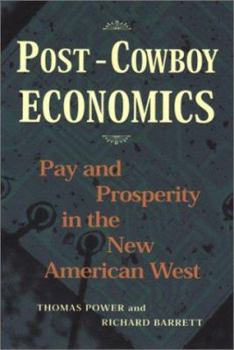Post-Cowboy Economics: Pay and Prosperity in the New American West
The book is very readable and is accessible to a wide audience of people interested in the American West, its economy, its development options, and the impact of environmental protection measures on... This description may be from another edition of this product.
Format:Paperback
Language:English
ISBN:1559638214
ISBN13:9781559638210
Release Date:July 2001
Publisher:Island Press
Length:225 Pages
Weight:0.70 lbs.
Dimensions:0.6" x 6.1" x 9.0"
Customer Reviews
2 ratings
Successfully debunking the myths of the western economy
Published by Thriftbooks.com User , 15 years ago
A loud segment of the population in the Intermountain West argues that the federal government is responsible for the low incomes and standards of living because it "locks up" valuable timber, mineral, and petroleum resources in national parks and other protected areas. This book argues instead that these federal lands improve the quality of life in the region, which is why people keep moving there. People are willing to earn lower incomes (1) where the cost of living is low; (2) to live in cities with a population under 500,000; and (3) to live where "amenity values" such as scenery and recreation are available. All these conditions characterize the West. The strength of the book lies not in that basic idea but in trying to nail it down statistically. There aren't any fancy statistics here but there is a lot of tables and graphs. The argument will make more sense if you've had some basic undergraduate economics. Even if you don't have that background, the authors explain themselves very well and I think you'll be able to make sense of what's going on. Unlike most economists, Power and Barrett also ask the tough question, "If we're right, why does everyone else get it wrong?" The answer relies on the common notion of "creating jobs" in popular economics and the associated mythology around producing tangible goods instead of intangible services. More important, though, is that powerful interests have an incentive to mischaracterize the regional economy in terms of resource extraction. If lands are opened up for logging or oil development, some people will make a lot of money. Those people propagandize to get the public to agree. Why they succeed, and why public-interest groups opposed to them do not, is a question lying outside the disciplinary toolkit these economists carry.
Mountain West Myth Busting
Published by Thriftbooks.com User , 21 years ago
The authors take a sharp needle to the over-inflated myth that the resource extraction industries (e.g., timber, mining, ranching) are the only ticket out of a downward trend in hourly pay in the region. Post-Cowboy Economics does the hard, analytical work that is required to get to the real root cause of why wages are generally lower in the Mountain West. To make its point, the authors focus on labor and demographic data over the years from 1978 to 1998. What you learn from their research:1. The contracting resource extraction industries in the Mountain West appear to have been driven by a pervasive national pattern in which jobs shifted from good production to services.2. The decline in average pay was due to downward pressure on pay in almost all industries (i.e., the loss of "good" paying jobs).3. The declines in pay during the 1980's were largely due to back-to-back national recessions. Although national in extent, the recessions hit the Mountain West hard.4. During the 80's and 90's technological advances and globalization of the American economy emerged as forces that caused the demand for labor to move from workers with little education and few skills toward workers with greater education and skills. These forces were felt the most in rural communities.The most interesting revelation for me came about when the authors compared wages to the population of the community. The data clearly shows the largest cities provide the best wages, and as you go down in population, the wages follow. This means that in comparing average pay in the Mountain West and the rest of the country, its important to consider where people live and work. Residents who live in the Mountain West typically live in smaller communities than other Americans. And this accounts for the gap in pay.The authors devote some time on how to form public policy in light of this post-cowboy economy. And thankfully its not one that looks backward to the good old days of job creation based on resource exploitation.






